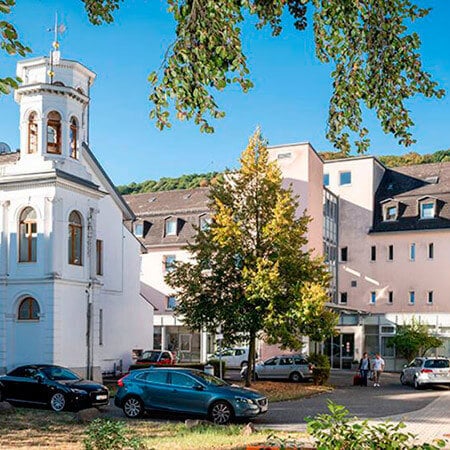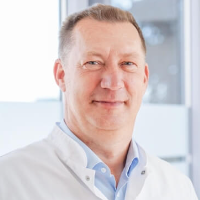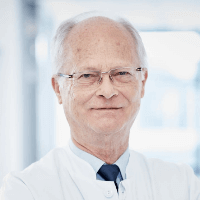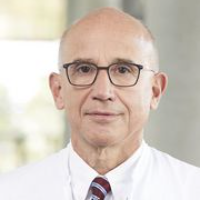Chemotherapy for Neuroendocrine Tumors (NETs) treatment
Treatment prices are regulated by national law of the corresponding countries, but can also include additional hospital coefficients. In order to receive the individual cost calculation, please send us the request and medical records.

Department of Oncology and Palliative Care
The Department of Oncology and Palliative Care provides palliative treatment for patients with incurable diseases. The goal of the department's physicians is to alleviate the symptoms of the disease and improve the quality of life. The department's specialists take an individual approach to each patient, always respecting the patient's wishes. A competent multidisciplinary team, consisting of palliative care specialists, nurses, psycho-oncologists, physiotherapists and social workers, works here for the benefit of the patients.





Department of Oncology and Surgical Oncology
The Department of Oncology and Surgical Oncology specializes in the conservative and surgical treatment of the full range of cancers. The department is one of the leading in the field of its competence in the international medical arena and treats patients with especially complex clinical cases. The priority focuses of the department's medical team include regional chemotherapy, hyperthermia, immunotherapy, surgical oncology and pain therapy. The goal of the department's doctors is to achieve an optimal therapeutic result with minimal damage to the healthy tissues.


Department of Hematology, Oncology, Rheumatology, Infectology and Bone Marrow Transplantation
The Department of Hematology, Oncology, Rheumatology, Infectology and Bone Marrow Transplantation offers modern diagnostics and treatment in all areas of its specialization. The medical facility treats patients with solid malignant tumors of various locations, malignant and benign diseases of the hematopoietic system, rheumatic diseases, and infections. The department enjoys a reputation as one of the leading health facilities for bone marrow transplants in Germany, which is confirmed by accreditation in accordance with JACIE standards. More than 80 allogeneic and more than 100 autologous bone marrow transplants are performed in the medical facility annually. In addition, the department successfully carries out innovative CAR T-cell therapy, which is available only in the most advanced medical centers worldwide. The department is part of the Comprehensive Cancer Center Ulm (CCCU), where a multidisciplinary team of highly professional doctors takes care of the health of patients. The high quality of medical services is confirmed by the certification of the German Cancer Society (DKG). The health of patients is in the safe hands of experienced specialists who strive to provide each patient with the most effective treatment using advanced therapeutic methods. The medical facility has 112 beds and many specialized outpatient clinics.






Neuroendocrine tumors (NETs) can occur in any organs where endocrine cells are normally present, i.e. in the gastrointestinal tract, lungs, thymus, kidneys, ovaries, prostate, mammary and thyroid glands, skin. Neuroendocrine cancer is a rare condition. Such tumors cause a significant deterioration in the quality of life of patients only at the advanced stages of the disease.
Overview
The neuroendocrine system is represented by cells that are located in various organs, i.e. the digestive tract, thyroid gland, adrenal glands, respiratory tract, etc. These types of cells perform regulatory functions and are also able to synthesize biologically active substances, including hormones. Neuroendocrine tumors are classified as malignant (Merkel's cancer, neuroendocrine thyroid cancer) and mixed neoplasms, for example, pheochromocytomas or carcinoids, which have the risks of the malignant transformation.
Neuroendocrine tumors are capable of producing hormones. For example, pheochromocytoma produces adrenaline and norepinephrine, leading to severe arterial hypertension that can threaten the patient's life. Treatment of neuroendocrine cancer is mainly surgical but it can also include chemotherapy. Cancer treatment is complemented by measures to normalize hormonal balance, as well as by chemotherapy and radiotherapy.
Neuroendocrine tumors (NETs) of the abdominal and retroperitoneal organs account for about 20% of all neoplasms of the gastrointestinal tract and about 2% of all malignant neoplasms. Neuroendocrine cancer’s most frequent localization is the gastrointestinal tract (about 73.7% of cases) and the bronchopulmonary system (about 25.1% of cases). Within the gastrointestinal tract, neuroendocrine cancer is localized in the small intestine (about 28.7% of cases), the appendix (about 18.9% of cases), and the rectum (about 12.6% of cases). The overall 5-year survival rate of neuroendocrine cancer patients regardless of location is about 67.2-82%.
Neuroendocrine tumors (NETs) are a heterogeneous group of neoplasms originating from neuroendocrine cells with biologically active properties. Neuroendocrine cancer can occur in any organs where endocrine cells are normally present. Thus, given such a wide range of NETs, your doctor of any specialty can suspect and diagnose NETs in the practice. However, it should be noted that in most cases, your doctor may be unfamiliar with neuroendocrine cancer.
Of course, the question arises about the incidence of NETs. More recently, it was believed that neuroendocrine cancer is a rare pathology. However, data from large population studies suggest the opposite.
The approximate incidence of neuroendocrine cancer is 5 per 100 thousand people annually. Considering that the majority of neuroendocrine tumors are characterized by relatively slow growth, the true incidence is much higher and amounts to approximately 35 per 100 thousand people annually. Besides, the incidence of neuroendocrine cancer is growing faster compared to the other types of cancer. Of great interest is the fact that neuroendocrine tumors of the gastrointestinal tract are more common than cancers of the stomach and pancreas combined. Such a significant increase in the frequency of occurrence can probably be explained by the improvement of diagnostic methods, in particular, endoscopic, and by the availability of high-precision imaging methods, such as computed and magnetic resonance imaging. Considering that in the future there will be further improvements in diagnostic methods, it can be expected that neuroendocrine cancer will be detected even more often.
For neuroendocrine cancer, a completely different clinical course is typical, which influences the rate of progression and response to therapy. However, there is no doubt that the earlier the diagnosis is made, the more effective the treatment will be.
This important fact is proved by data on the survival rate of patients with neuroendocrine cancer, depending on the stage of the disease.
Symptoms
The obligatory participation of the general practitioner in making the diagnosis of neuroendocrine cancer is essential, since the clinical picture of NET resembles diseases from completely different disciplines. In addition to specific clinical syndromes, for example, Cushing's syndrome or acromegaly caused by hypersecretion of cortisol and growth hormone, respectively, in most cases there are non-specific symptoms.
So, the following clinical manifestations are the most common for neuroendocrine cancer:
- Hot flashes
- Diarrhea
- Bronchoconstriction syndrome
Rare syndromes in this cancer are:
- Diabetes mellitus, metabolic syndrome, non-alcoholic fatty liver disease
- Arterial hypertension
- Neuromyopathy
- Pigmentation, arthropathy
- Hypoglycemia
- Ulcerative lesion, rash
- Mental disorders
Thus, the manifestation of NET symptoms often mimics a large number of different diseases common in the general population. The diagnosis and treatment of such pathologies are performed by a primary care physician – your doctor. The natural development of NET may also be accompanied by the so-called carcinoid syndrome.
For about 10-12 years, patients with this type of NETs may complain of irritable bowel syndrome, and only after that the diagnosis of NET is established. Thus, your doctor plays an initiating role in the treatment of NET, the importance of which cannot be overestimated. This is connected with the high prevalence of NETs and atypical clinical picture of NETs. With early diagnosis of NETs and prescription of therapy, patients have more optimistic prognosis.
Diagnostics
Treatment of neuroendocrine cancer begins with diagnostics, during which the tumor is visualized, its size and localization are assessed, the histological type of tumor and the stage of cancer are established. Methods that are used in making the diagnosis of neuroendocrine tumors include:
- Primary examination and consultation with your doctor
- Examination and consultation with an oncologist
- Biochemical blood and urine tests to determine the concentration of hormones or other substances
- Blood test for chromogranin A
- X-ray examination
- PET-CT with somatostatin
- Computed tomography, magnetic resonance imaging
Biopsy and histopathological examination are required to establish whether the lesion is benign or malignant. Biopsy of neuroendocrine tumors is not always possible technically, and in such cases, the diagnosis is made based on indirect signs.
Neuroendocrine tumors can have several peculiarities, including genetic characteristics, the presence of certain proteins on the cell membrane, etc.
Treatment options
Chemotherapy is commonly used to treat neuroendocrine tumors (NETs). Your doctor may prescribe chemotherapy for certain reasons including:
- Control of symptoms caused by the excess of certain hormones produced by a tumor
- Slowing down the growth and symptoms of cancer
- Destruction of neuroendocrine cancer cells
- Relieving the symptoms of neuroendocrine cancer (palliative therapy)
Your doctor will consider your personal needs to plan the chemotherapy doses and schedules of treatment. Your doctor may decide on a combination of different drugs or other treatments with chemotherapy.
Chemotherapy uses anticancer drugs to destroy cancer cells. It is usually only used to treat poorly differentiated neuroendocrine tumors when other treatments don’t work or can’t be used.
Chemotherapy may be systemic, which means that the drugs travel through the blood to reach and destroy cancer cells all over the body. Chemotherapy may also be local. Local chemotherapy is introduced to a specific area of the body. Chemoembolization can be used to deliver chemotherapy directly to tumors.
Your doctor will choose the chemotherapy drugs or their combination depending mainly on where cancer is located. Chemotherapy drugs that are used alone or in combination to treat NETs include:
- Capecitabine (Xeloda)
- Temozolomide (Temodal)
- Streptozotocin (Zanosar)
- 5-fluorouracil (Adrucil, 5-FU)
- Cisplatin
- Carboplatin (Paraplatin, Paraplatin AQ)
- Etoposide (Vepesid, VP-16)
- Doxorubicin (Adriamycin)
The overall goal of the treatment of neuroendocrine cancer is to remove the primary tumor and metastases.
In the case of advanced tumor processes, the presence of metastases and recurrence of NETs, cytoreductive methods are used to reduce the tumor mass before chemotherapy. A promising scientific field is the study of combination therapy with chemotherapy and targeted therapy.
For patients with inoperable and metastatic NETs, peptide receptor radionuclide therapy with somatostatin analogs is indicated. Unlike chemotherapy, the efficacy of the peptide receptor radionuclide therapy differs depending on the expression of somatostatin receptors by NET cells and the possibility of penetration of drugs into the tumor tissue. The response to treatment is determined using biochemical markers (chromogranin A) and imaging techniques (CT and MRI).
Thus, the use of chemotherapy for the treatment of neuroendocrine cancer allows your doctor to effectively control the syndrome of overproduction of regulatory peptides, significantly improving the quality of life of cancer patients.
Where can I undergo treatment with chemotherapy abroad?
Health tourism is becoming more and more popular these days, as medicine abroad often ensures a much better quality of treatment with chemotherapy.
The following European hospitals show the best success rates in the treatment of neuroendocrine tumors with chemotherapy:
- MediClin Robert Janker Clinic, Germany
- Medias Cancer, Clinic Burghausen, Germany
- Memorial Sisli Hospital Istanbul, Turkey
- Memorial Bahcelievler Hospital Istanbul, Turkey
- University Hospital Ulm, Germany
You can find more information about the leading world’s and European hospitals on the Booking Health website.
The cost of treatment with chemotherapy
The prices in the leading world’s European hospitals listed on the Booking Health website are relatively low. With Booking Health, you can undergo treatment of neuroendocrine tumors with chemotherapy at an affordable price.
The cost of treatment varies, as the price depends on the hospital, the specifics of the disease, and the complexity of its treatment.
The cost of treatment with chemotherapy in Germany is 6,949-9,893 EUR.
The cost of treatment with chemotherapy in Turkey is 3,766-3,896 EUR.
You might want to consider the cost of possible additional procedures and follow-up care. Therefore, the ultimate cost of treatment may differ from the initial price.
To make sure that the overall cost of treatment is suitable for you, contact us by leaving the request on the Booking Health website.
How can I undergo treatment with chemotherapy abroad?
It is not easy to self-organize any treatment abroad. It requires certain knowledge and expertise. Thus, it is safer, easier, and less stressful to use the services of a medical tourism agency.
As the largest and most transparent medical tourism agency in the world, Booking Health has up-to-date information about the treatment of neuroendocrine tumors with chemotherapy in the best world’s and European hospitals. We will help you select the right clinic taking into account your wishes for treatment.
We want to help you and take on all the troubles. You can be free of unnecessary stress, while Booking Health takes care of all organizational issues regarding the treatment. Our services are aimed at undergoing treatment of neuroendocrine tumors with chemotherapy safely and successfully.
Medical tourism can be easy! All you need to do is to leave a request on the Booking Health website, and our manager will contact you shortly.

